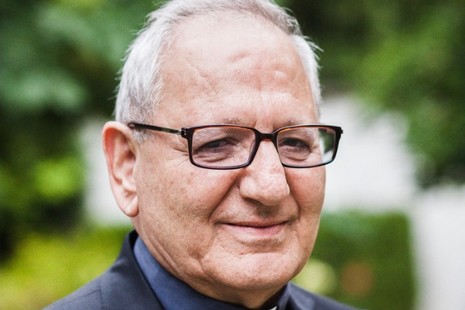Patriarch Louis Raphael Sako of the Chaldeans spoke to “La Croix” about ways to assist displaced Iraqis and refugees in returning home.
n and to rebuild.
At Batnaya to the north of Mosul, 80% of the houses have been destroyed but 300 are still intact and the families who desire to return have registered to do so.
The biggest problem is in the south of the Nineveh plain and in the Syrian Catholic villages. This zone remains contested by Sunnis, Shiites, and Kurds.
Considering that they have made many sacrifices, the Kurds want to stay in the villages that they have liberated. The same for the Shiites…
Two days after the liberation, I went to meet the Iraqi generals to tell them that the Christians belong to this land which is in a way their “promised land”.
What proportion of the displaced and the refugees are likely to return to their villages?
LRS: Among the Christians, I estimate that 80% of the displaced in Iraq would like to return home. At Baqofah, near Batnaya, around forty families have already returned to their homes. Others are waiting for the end of the school year to do so.
But there are still many obstacles, including the destruction as well as political disorganization. We do not oblige anyone to remain but we fear that if the families do not return then the demographic balance of the region will be overturned.
How to assist in the rebuilding?
LRS: The most urgent thing is to de-mine the fields and villages and to clear the roads. We need organizations like L’Oeuvre de l’Orient (Work of the Orient) and others to help finance the restoration of houses.
All the villages destroyed by ISIS need to be rebuilt, not just the Christian villages! Spiritual and human support is also important. It helps Iraqis to persevere and continue to have hope.
Politically, the international community needs most of all to support the reconstruction of the country on a citizenship basis. An end to sectarian laws that make Christians second-class citizens, either kuffars (evildoers) or dhimmis (protected ones), is necessary. We don’t accept this.
What is needed is a civil status, i.e. a state that is separate from religion. Some politicians are beginning to adopt this language on television, which is also what I heard at Al Azhar.
I often repeat to politicians whom I meet in Baghdad that without a civil status Islam has no future. No progress will be possible.
Muslims cannot continue to live like as if it were the desert in the 7th century. They have to accept that the world has changed and that there are no more “majorities” and “minorities”, that we are no longer a danger for them.
They need to recognize pluralism and diversity as an opportunity.
How to bring Iraq out of its communitarian enclosure?
LRS: It will be a long path! I feel it myself. The two houses that belong to my family in Mosul were looted by our neighbors. Psychologically, it is difficult.
Today, we are all contaminated by a “Bedouin” spirit. Instead of identifying as Iraqis, we turn in on our “ethnic” communities where each person wants to be the head.
Our communities themselves are also divided. Muslims between Sunnis and Shiites, Christians among Assyrians, Armenians, Chaldeans, etc. This mentality needs to change.
Moreover, we feel that the Muslims themselves are tired of these absurd wars, which have caused thousands of deaths, unnumbered ruins and more than four million displaced people and refugees.
Some Christians, particularly those who have left the country, are not realistic. They want a province, an autonomous region, and blue helmet to protect them… It is impossible!
I think that the observers sent by the European Union to the villages will warn of the risk of attacks and reassure the Christians.
Beyond that, the only way forward is to rebuild friendship with our neighbors. Tomorrow, I will go to Mosul to bring aid to 4,000 families of displaced people. We cannot remain indifferent to the suffering of the people.
Source: La Croix International






